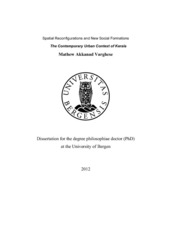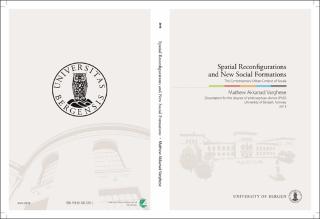| dc.description.abstract | Urbanisation and global relationships have had deep historical impacts all along the western coast of Indian peninsula in general and Kerala in particular. It is both inadequate and inaccurate to invest everything ‘urban’ with moments of history like encounters with foreign corporate networks (from the Portuguese to the British). This is not to reduce the importance of such interventions. For instance large scale reorganisations of life as with bureaucratisations during the British phase did indeed give rise to new power equations through active engagements with existing structures. The present urban turn becomes interesting because of the possibility of unprecedented tendencies as well as ruptures to continuities. The immense flexibilities associated with urban ideas as in the case of cities in the making and their disjunctures with the regional patterns are important pointers. Cities now appear as free floating zones of exceptions (as those marking the field locales like Kakkanad or Vallarpadom) that could be cloned anywhere. The state of Kerala with no metropolitan centre, and historically informed by constellations of evenly spaced small towns, does contribute to some of the specific processes. But the contemporary urban processes are thought to provide radical breaks with erstwhile urban phenomena and set the stage to rethink anthropology in a newer historical and ethnographic context. The hypothesis was that the transformations in the modes of production and production of spatialities occurring as/through social formations could be entering a unique paradigm as represented by the current urban context of Kerala. If so the reconfigurations of urban governance may be embodied as everyday subjectivities produced in some of the newly urbanising spaces, transacting in totally new ways to the historicity of everyday life. The idea of 'city' or that of 'urban' has been changing according to historical implications. It would of course become sheer reification to give a universal meaning to 'urban'. So the problematic should be to uncover the changing presentations through history. The modern state of Kerala was carved out of a mosaic of different social and processes that had trajectories distinct from other parts of the nation state. This is so with the characteristic colonial caste orderings, the reformist tendencies or the large scale land reforms mediated by left wing movements. The welfarist expectations associated with an imagined state or generated out of the all encompassing political public sphere, all unravel in novel equations with neoliberal urban processes/reforms. The possible reconfigurations of state within contemporary global assemblage (neoliberal capitalist, led by extra state actors and state-like bodies) cannot be understood if processes are understood as abstract spatialities that only refracts dichotomies like global/ local, subject/object, structure/agency, etc. What may be important are the ways in which life forms negotiate changing requirements in situations. The global that gets articulated in urban processes is a composite effect of the specific social and cultural negotiations that manifest a distinct capacity for decontextualisation, recontextualisation, and mobility across diverse social situations and relationships. The fieldwork focused on the newly urbanizing zones in Ernakulam District in Kerala. The territorial emphasis was on four study areas identified as the sites of or adjacent to new urban projects and programmes of development. Pallikkara, Kizhakkambalam, and Kakkanad lie in contiguously located Local Self Governing Institutions (LSGIs). The work at times extended to the Vypeen Island. I sought to understand how people in these places relate to each other through time and space, and how they constitute themselves in their respective living spaces in terms of historical relationships, institutions, and other linkages specific to the changing social scene. A reality that was yet to take shape often got invested in life processes as immense flexibilities. People, in such situations, restructured life as well as aspirations in characteristic ways. This was of course with consequences for the ways novel regimes and order that took form and generated concomitant rationalisations. | en_US |

